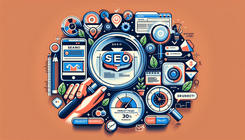How to Optimize Your Shopify Store Before Launch: A Comprehensive Guide by BemeApps
Launching a Shopify store is an exciting endeavor, but before you dive into digital marketing, it's crucial to ensure your store is optimized for both user experience and SEO. In this guide, we'll explore key areas to focus on and provide actionable insights to enhance your store's performance and credibility.
Understanding the Importance of SEO Optimization
SEO (Search Engine Optimization) is vital for driving organic traffic to your Shopify store. Without proper SEO, your store might remain invisible to potential customers searching for products like yours.
Key Areas for SEO Improvement
-
Title Tags and Meta Descriptions: These elements are crucial as they are the first things potential customers see in search engine results. Ensure they are keyword-rich and compelling to encourage clicks.
-
Image Alt Text: Alt text helps search engines understand what your images are about. Use descriptive and keyword-focused alt text for all product images.
-
Content Structure: Organize your content with clear headings and subheadings. This not only helps with SEO but also improves readability for users.
Enhancing Design & User Experience
A visually appealing and easy-to-navigate design can significantly impact user engagement and conversion rates.
Design Tips for Better User Experience
-
Clean and Professional Layout: Avoid clutter and use a consistent color scheme and typography throughout your site.
-
Mobile Responsiveness: Ensure your site functions well on both desktop and mobile devices. A mobile-friendly design is crucial as more users shop on their phones.
-
Intuitive Navigation: Use clear categories and a search bar to help users find products easily.
Crafting Effective Product Pages
Product pages are where customers decide whether to purchase, so they need to be informative and persuasive.
Key Elements of High-Performing Product Pages
-
Clear and Informative Descriptions: Highlight the benefits and features of your products. Use bullet points for easy reading.
-
High-Quality Images and Videos: Showcase your products with clear images and consider adding videos to demonstrate their use.
-
Additional Features: Consider adding customer reviews, size guides, and FAQs to address common questions and build trust.
Improving Speed and Performance
A fast-loading website is crucial for retaining visitors and improving SEO rankings.
Tips to Enhance Website Speed
-
Optimize Images: Compress images without losing quality to reduce loading times.
-
Leverage Browser Caching: Use caching to store static files and reduce server load.
-
Minimize HTTP Requests: Reduce the number of elements on your page to speed up loading times.
Building Trust & Credibility
Trust is essential for converting visitors into customers. Here are ways to build credibility for your store.
Strategies to Enhance Trust
-
Add Trust Badges: Display security badges and payment icons to reassure customers.
-
Showcase Customer Reviews: Positive reviews and testimonials can significantly influence purchasing decisions.
-
Implement Live Chat: Offer real-time support to address customer inquiries promptly.
Addressing Common Challenges and Solutions
Problem: Low Conversion Rates
Causes: Poor user experience, lack of trust, unclear value proposition.
Solutions: Improve site navigation, add social proof, and refine product descriptions.
Problem: High Bounce Rates
Causes: Slow loading times, irrelevant content, confusing layout.
Solutions: Optimize site speed, ensure content matches user intent, simplify design.
Related Questions
Q: How can I check if my Shopify store is optimized for mobile? A: Use Google's Mobile-Friendly Test tool to analyze your store's mobile compatibility.
Q: What are some tools to improve my Shopify store's SEO? A: Tools like Google Analytics, SEMrush, and Ahrefs can help you track and improve your SEO efforts.
Conclusion
Launching a Shopify store is just the beginning. By focusing on SEO, design, user experience, and trust, you can create a store that not only attracts visitors but also converts them into loyal customers. Implement these strategies to ensure your store is ready for a successful launch.
Related Posts
- Dropshipping with Shopify - BeME Community - BeMEApps
- eCommerce Platforms | BeMEApps Community
- FAQs | BeMEApps Community
- How to Leverage Sales Pop in Shopify to Boost Your ...
- How to Fix Images Not Showing in Carousel Within Shopify
Author by BemeApps AI.




